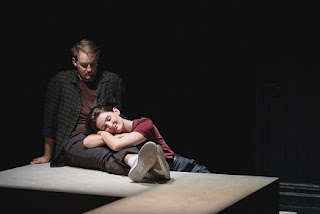This wonderful premise allows Stoppard to riff on all manner of subjects from the nature of fate to the profession of acting itself. This is metatheatre writ large with a play within a play within a play that inverts Hamlet by relegating its key characters to bit players, recontextualises many of that play's key moments, and explores in more detail how the ill-fated duo come to such an ending as the title doth suggest. Oh, and there's this - it's smart and really funny. There are elements of madcap humour reminiscent of that great wave of British comedians from the sixties and early seventies (the play was first staged in 1966) who would become household names such as the Pythons. Some scenes are constructed as elaborate skits and there is plenty of physical comedy, in-jokes, mime, and sight gags.
A play this layered and complex with rapid fire dialogue (and plenty of it), deft comic timing, and physical antics demands a lot from its two lead actors. I'm happy to announce that Alex Comstock as Guil... um... Rosencrantz, and Thomas Dimmick (Rosen... *ahem* ... Guildenstern) are more than up to the task. It's an impressive turn by both of them, immediately establishing a rhythm and genuine connection during the famous opening scene where the outcome of the repeated flip of a coin takes on portentous meaning... or not, depending on your point of view.
Comstock's Rosencrantz is initially full of almost boyish enthusiasm and naivety which plays well against Dimmick's more assertive and thoughtful Guildenstern. There are times when this is flipped to great effect as their predicament deepens. Comstock mimics and cavorts with glee while Dimmick prowls and grimaces in existential dread. They deliver the banter dialogue with precision while luxuriating in beats where the pause, as counterpoint, is expertly deployed. They are also fabulously attired in Merri Ford's Elizabethan styled costumes with Dimmick echoing Joseph Fiennes' look from Shakespeare In Love (co-written by one T. Stoppard). The third act is particularly affecting as greater forces intervene with both actors communicating the exasperation and confusion over how it could all go so cruelly wrong for these affable courtiers.
Around our title characters swirl two sets of notable contingents - the Court from Hamlet including the prince (Leigh Fitzpatrick) who mouths the famous soliloquy, stage right, which is such a wonderfully subversive beat; and poor old Polonius (Neale Paterson) who amusingly gets wheeled out in a barrow holding a shovel after he's despatched; and the Tragedians under the lead of The Player (Jeff Watkins) who foreshadow events and provide meta commentary through acted scenes from a play... within a play... which is within another... ... play. It's all glorious fun. Watkins brings the swagger and imbues The Player with vanity and insight while the Tragedians are a delight. Superb face makeup by Yvette Wetherilt and striking costuming by Ford, along with the vaudeville style antics of Codey Finlay, Jordan D’Arcy, Daniel Suttner, Alex Ketko, and Tom Tasovac as Alfred, provide many memorable interactions. They work well as a company of players playing a... company of pla-- okay, you get it... with each having a highlight in portraying over-the-top deaths or heightened emotion.
I was quite taken by the lighting design of Fiona Reid, notably in the third act when we're at sea on a boat at night. Wonderfully lit and atmospheric as the mood is contemplative and a key deception is revealed. There are also moments, earlier, when the whole stage is brightly illuminated as if there is a literal spotlight on the central characters.
I loved the back-and-forth dialogue, circular arguments, and japery but just as important is the use of silence as we empathise with the characters or feel their uncertainty. Director Tony Petani and co-director Emily Keys also aren't afraid to slow things down and take advantage of the large performance space of the New Fortune Theatre. Characters traverse the stage like chess pieces, unhurried and deliberate. As the duos' dilemma deepens though the action becomes more frantic and theatrical.
This is an excellent production of a notable play that mirrors one of the most famous plays of all time. There truly are no small roles, only two minor characters thrust into the spotlight where the periphery becomes centre stage and the toss of a coin is something more than random chance. It's funny, provocative, and a pure delight to watch exceptional writing executed with such flair and attention to detail in all departments.




















